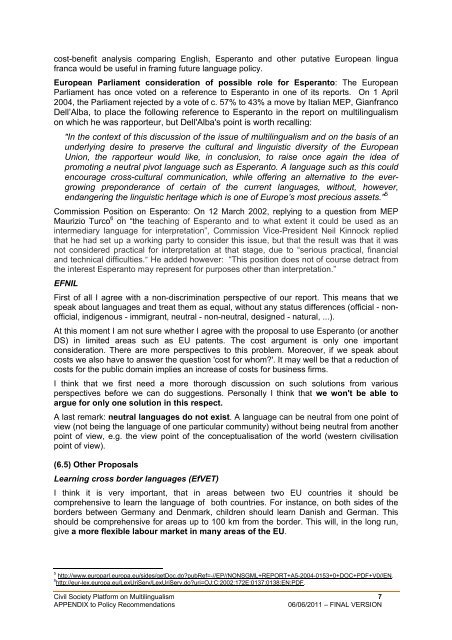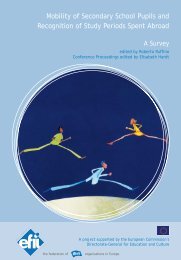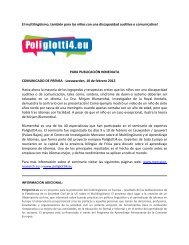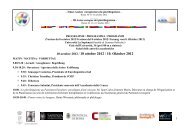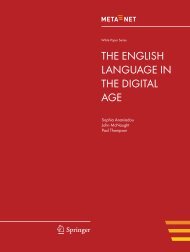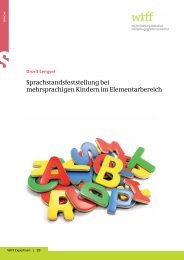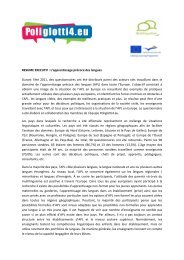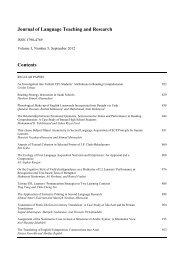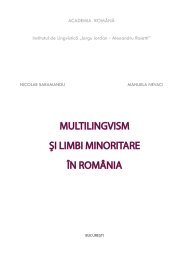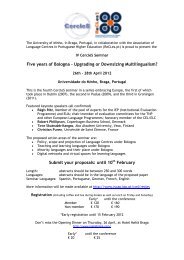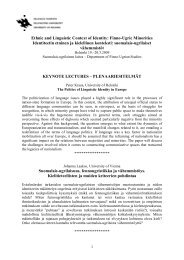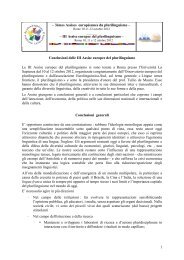FULL VERSION - European Commission - Europa
FULL VERSION - European Commission - Europa
FULL VERSION - European Commission - Europa
You also want an ePaper? Increase the reach of your titles
YUMPU automatically turns print PDFs into web optimized ePapers that Google loves.
cost-benefit analysis comparing English, Esperanto and other putative <strong>European</strong> linguafranca would be useful in framing future language policy.<strong>European</strong> Parliament consideration of possible role for Esperanto: The <strong>European</strong>Parliament has once voted on a reference to Esperanto in one of its reports. On 1 April2004, the Parliament rejected by a vote of c. 57% to 43% a move by Italian MEP, GianfrancoDell’Alba, to place the following reference to Esperanto in the report on multilingualismon which he was rapporteur, but Dell'Alba's point is worth recalling:"In the context of this discussion of the issue of multilingualism and on the basis of anunderlying desire to preserve the cultural and linguistic diversity of the <strong>European</strong>Union, the rapporteur would like, in conclusion, to raise once again the idea ofpromoting a neutral pivot language such as Esperanto. A language such as this couldencourage cross-cultural communication, while offering an alternative to the evergrowingpreponderance of certain of the current languages, without, however,endangering the linguistic heritage which is one of Europe’s most precious assets." 5<strong>Commission</strong> Position on Esperanto: On 12 March 2002, replying to a question from MEPMaurizio Turco 6 on “the teaching of Esperanto and to what extent it could be used as anintermediary language for interpretation”, <strong>Commission</strong> Vice-President Neil Kinnock repliedthat he had set up a working party to consider this issue, but that the result was that it wasnot considered practical for interpretation at that stage, due to “serious practical, financialand technical difficulties.” He added however: “This position does not of course detract fromthe interest Esperanto may represent for purposes other than interpretation.”EFNILFirst of all I agree with a non-discrimination perspective of our report. This means that wespeak about languages and treat them as equal, without any status differences (official - nonofficial,indigenous - immigrant, neutral - non-neutral, designed - natural, ...).At this moment I am not sure whether I agree with the proposal to use Esperanto (or anotherDS) in limited areas such as EU patents. The cost argument is only one importantconsideration. There are more perspectives to this problem. Moreover, if we speak aboutcosts we also have to answer the question 'cost for whom?'. It may well be that a reduction ofcosts for the public domain implies an increase of costs for business firms.I think that we first need a more thorough discussion on such solutions from variousperspectives before we can do suggestions. Personally I think that we won't be able toargue for only one solution in this respect.A last remark: neutral languages do not exist. A language can be neutral from one point ofview (not being the language of one particular community) without being neutral from anotherpoint of view, e.g. the view point of the conceptualisation of the world (western civilisationpoint of view).(6.5) Other ProposalsLearning cross border languages (EfVET)I think it is very important, that in areas between two EU countries it should becomprehensive to learn the language of both countries. For instance, on both sides of theborders between Germany and Denmark, children should learn Danish and German. Thisshould be comprehensive for areas up to 100 km from the border. This will, in the long run,give a more flexible labour market in many areas of the EU.5http://www.europarl.europa.eu/sides/getDoc.do?pubRef=-//EP//NONSGML+REPORT+A5-2004-0153+0+DOC+PDF+V0//EN.6http://eur-lex.europa.eu/LexUriServ/LexUriServ.do?uri=OJ:C:2002:172E:0137:0138:EN:PDF.Civil Society Platform on Multilingualism 7APPENDIX to Policy Recommendations06/06/2011 – FINAL <strong>VERSION</strong>


